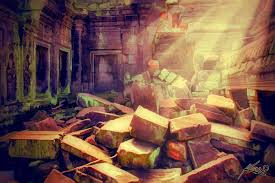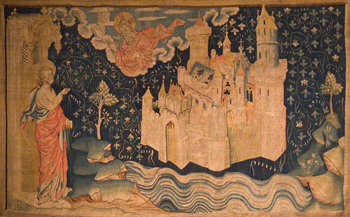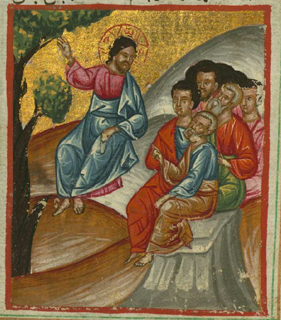For Sunday November 17, 2019
Lectionary Readings (Revised Common Lectionary, Year C)
Malachi 4:1-2a
Psalm 98
2 Thessalonians 3:6-13
Luke 21:5-19
According to the 1st century historian, Josephus, the Jerusalem temple of Jesus’s day was an awe-inspiring wonder. Newly reconstructed by Herod the Great, the temple’s retaining walls were composed of stones forty feet long. The temple occupied a platform twice as large as the Roman Forum and four times as large as the Athenian Acropolis. Herod reportedly used so much gold to cover the outside walls that anyone who gazed at them in bright sunlight risked blinding herself.
No wonder, then, that Jesus’s followers in this week’s Gospel reading are so dazzled by their house of worship. As Luke describes the scene, the followers fawn over the adornment of the temple, remarking on the “beautiful stones” and “gifts dedicated to God” that make up the edifice's splendor.
But Jesus isn’t impressed. Instead, he responds to their admiration with a chilling prediction: “As for these things that you see, the days will come when not one stone will be left upon another; all will be thrown down.”
In other words, even though Jesus and his followers look at the same temple, they do not see the same thing. What the disciples see is an architectural marvel, yes. But it's also the biggest, boldest, and most unshakeable symbol of God’s presence they’re capable of imagining. For them, the massive stones of the temple hold religious memory. They bolster a colonized people’s identity. They offer the faithful a potent symbol of spiritual glory, pride, and worthiness. In short, what takes the followers’ breath away as they gaze at the temple is the religious certainty and permanence those glittering stones display to the world.
 |
That’s what Jesus’s disciples see. But what does Jesus see? He sees ruins. Rubble. Destruction. Fragility, not permanence. Loss, not glory. Change, not stasis. Jesus sees all that must break and buckle and end before new life and new hope will emerge. He sees the necessity of death before the promise of resurrection.
This passage from Luke’s Gospel is often described as apocalyptic. If you’re like me, your cultural references for “apocalypse” probably include Marvel superhero movies, the “Left Behind” fiction series, and the Book of Revelation. When I hear the word, I think of interplanetary warfare, the four horsemen, vacant-eyed zombies lurching through decimated neighborhoods, and the wholesale nuclear destruction of the planet.
But in fact, “apocalypse” means something quite different. An apocalypse is an unveiling. A disclosure of something secret and hidden. To experience an apocalypse is to experience fresh sight. Honest disclosure. Accurate revelation. It is to apprehend reality as we’ve never apprehended it before.
In this sense, what Jesus offers his disciples in the remainder of this week’s Gospel reading is an apocalyptic vision. He invites them to look beyond the grandeur of the temple, and recognize that God will not suffer domestication. The temple is not the epicenter of his salvific work; God is not bound by mortar and stone. God exceeds every edifice, every institution, every mission statement, every strategic plan, and every symbol human beings create in his name. Moreover, God is not enslaved to superlatives; we’re the ones easily seduced by the biggest, the newest, and the shiniest objects around us.
 |
In her sermon collection, God in Pain, Barbara Brown argues that disillusionment is essential to the Christian life: "Disillusionment is, literally, the loss of an illusion — about ourselves, about the world, about God — and while it is almost always a painful thing, it is never a bad thing, to lose the lies we have mistaken for the truth."
As I envision myself in the disciples’ place, listening in bewilderment as Jesus pops my spiritual bubbles, here are some of the questions I’m asking:
- What lies and illusions do I mistake for truth?
- In what memories or traditions do I attempt to “house” God?
- On what shiny religious edifice do I pin my hopes, instead of trusting Jesus? (My denomination? My church? My spiritual heritage?)
- Why do I cling to permanence when Jesus invites me to evolve?
- Am I willing to sit with the fact that things fall apart? (Things I love, things I built, things I cried and prayed and strived for?)
- Can I embrace a journey of faith that includes rubble, ruin, and failure?
“Let us pray to God that we may be free of God,” the 13th century mystic Meister Eckhart writes, implying that our conceptions of God and faith must always fall short, always fail. Let’s name honestly, he suggests, the imposter gods we conjure because we fear the Mystery who really is. Let’s admit that we shape these gods in our own image, and that they serve us as much as we serve them. In other words, let’s endure apocalypse so that truth will set us free. Let’s dare to see what Jesus sees.
In the second part of the Gospel story, Jesus teaches his disciples what to do and how to live when the walls come tumbling down. Contrary to what our hysteria-hungry, “if it bleeds, it leads” culture so often encourages, Jesus insists on calm strength and truthful testimony in the face of the apocalyptic.
“Do not be terrified,” he says, when the earth shakes, and nations make war, and imposters preach alluring gospels of fear, resentment, and hatred. Don’t give in to despair. Don’t capitalize on chaos. Don’t neglect to bear witness. God is not where people often say God is. God doesn’t fear-monger. God doesn't sensationalize. God doesn’t thrive on human dread.
So avoid hasty, knee-jerk judgments. Be perceptive, not pious. Imaginative, not immature. Make peace, choose hope, cultivate patience, and incarnate love as the world reels and changes. Expect things to get hard. And then expect them to get harder. Endure even when they do. Know that God is near, no matter what the world looks or feels like. Speak the truth, trusting that God’s Spirit is alive and present in our acts of bearing witness. Be faithful until the end, because God is still — always and everywhere — a God of love.
 |
For me, this is the great challenge of the Gospel. Not simply to bear the apocalypse, but to bear it well. To bear it with the courage, calm, and faith Jesus calls me to practice in this passage.
For many of us, this has been an emotionally and spiritually exhausting few years. We need look no further than the daily news to see apocalyptic images scarier than any Hollywood might produce. Here in California, thousands of acres of land are burning from massive wildfires. Elsewhere, families are starving, or living on the streets, or struggling in the shadow of relentless war, or suffering racial or sexual violence, or attempting to cross a national border because the horrors they’re leaving behind are worse than the dangers that lie ahead.
In this troubling context, it’s easy to despair. Or to grow numb. Or to let exhaustion win. But it’s precisely now, now when the world around us feels the most apocalyptic, that we have to respond with resilience, courage, and truthful, unflinching witness. It’s precisely now, when systemic evil and age old brokenness threaten to bring us to ruin that we have to testify without fear and without shame to the Good News that is the Gospel. What’s happening is not death, but birth. Yes, the birth pangs hurt. They hurt so appallingly much. But God is our midwife, and what God births will never lead to desolation. Yes, we are called to bear witness in the ruins, but rest assured: these birth pangs will end in joy. By our endurance, we will gain our souls.
Debie Thomas: debie.thomas1@gmail.com
Image credits: (1) Check Out the Sermons; (2) Wikipedia.org; and (3) Wikimedia.org.





